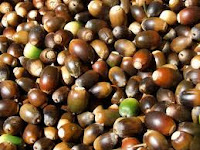Yep, our oak trees over five months after they started to drop their acorns in late September 2012 - continue to do so. The phenomenon that started off as wonder and amazement has turned into a pain in the butt. A couple of weeks ago we pulled from the lawn and one of the flower beds beneath just one oak - six yardbags of acorns with each bag estimated at from 50-60 pounds. We note that same area had been raked twice before with similar harvests when the carpet of acorns exceeded one inch (do the math). The sidewalk has been swept at least twice a week since they started dropping. There is still the upper bed to contend with (the great majority of the acorns) and, yes, the acorns are still falling!
The acorns aren’t green any more, rather the mature brown nuts along with mostly the cuplets that held the nuts. It’s been raining (OK hailing) acorns for months now and we are ready for it to end.
The squirrels and other critters including many bird species are having a feast and quite upset that this writer is hauling away what they consider their well-earned bounty. I frankly don’t give a damn, my dear… and what about those beautiful mallards that have a renewed affection for our lawn? They’re back and if we were in the country there would surely be deer aplenty.
The single biggest pain is keeping our cairn terrier away from the acorns and that potentially deadly gallotannin, a combination of gallic and tannic acids that resides in acorns. She has already made herself sick once. Please understand that acorns, oak buds, oak leaves, and even the drinking water in which acorns and oak leaves have soaked, can cause oak poisoning that can lead to renal failure and death in dogs. By their very nature the acorn’s hard shell can potentially also cause an obstruction, even perforation, of the intestines, a real risk for our smaller dog. This is absolutely no laughing matter and if you love your pet, take all necessary precautions.
So, we’ve had what they call a 'Mast Year' for Acorns and the botanists/arborists really don’t know why except to speculate that it’s probably associated with the weather/climate and/or genetics - a chemical signal/cue given off by the oak trees. This phenomenon despite our 21st century technology remains what they are calling, “an amazing mystery of nature”. Since acorns are not an overnight sensation (it takes two years to form an acorn), the mystery deepens even further. It would appear the 2011 drought followed up by a significant (for us) wet season was perfect weather for acorn production and this seemingly synchronized behavior throughout north and east Texas. They also say stressed trees drop more acorns to insure their propagation so an arborist is watching our trees closely.
We pondered that and other acorn trivia and then asked what good are they except for the wildlife that can tolerate the nuts as part of their diet and perhaps supply those nurserymen intent on restoring the great Caledonian Forest with good stock. A suspect source offered that it was an ancient British tradition to carry an acorn on their person in order to guarantee long life, good luck, immortality, youth (I guess they could go hand-in-hand), relief from pain, protection from storms, from getting lost and from those who would do them harm.
We don’t think that the Scots have any such tradition (acorn in your sporran?) though a case might be made for the Druids and the Norse. And if that acorn can keep us young, then we are unfortunately a day, or longer, late. So failing that – who cares - though as one arborist offered, “When is the last time you made oxygen?” OK, we’re onboard.
Aye,
Ned Buxton


No comments:
Post a Comment